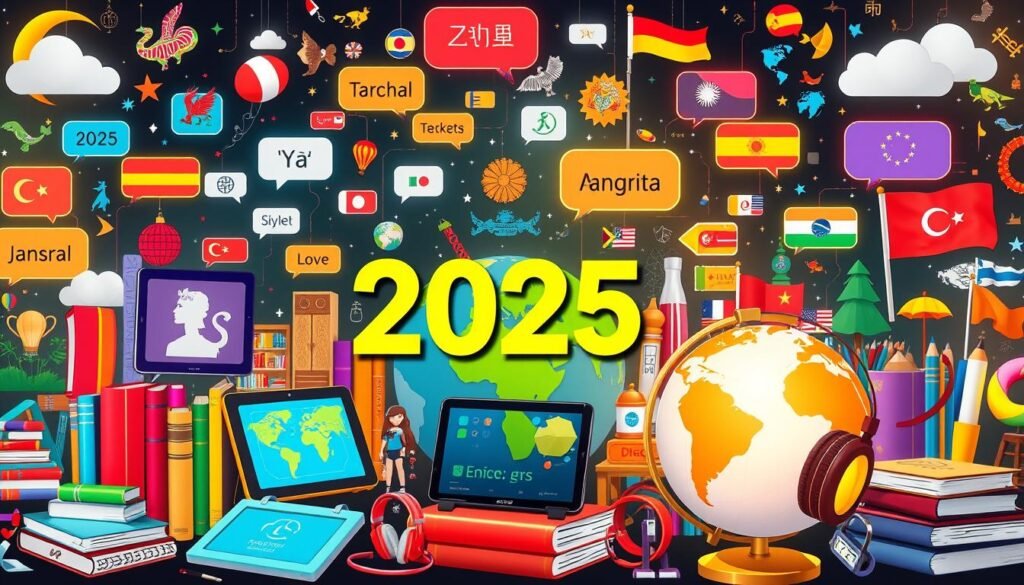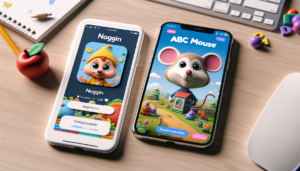Rosetta Stone vs Babbel vs Pimsleur: Which Language App is Best for 2025?
The world of language learning is always changing. As we get closer to 2025, many people wonder which platform is the best. This detailed look at Rosetta Stone vs Babbel vs Pimsleur will help you choose wisely. It’s all about finding the right tool to unlock your language skills.
Being able to speak many languages is key in today’s world. It opens doors in your career, helps you connect with different cultures, and feeds your curiosity. We’ll dive into what makes each platform special. This way, you can pick the one that fits your learning style and goals.

Table of Contents
Key Takeaways
- Explore the latest advancements in digital language learning platforms that will shape the landscape in 2025.
- Discover the unique approaches and key features offered by Rosetta Stone vs Babbel vs Pimsleur.
- Analyze the pricing structures, subscription models, and long-term value propositions of these industry leaders.
- Understand how each platform integrates innovative learning methods and cutting-edge technologies.
- Gain the knowledge to make an informed decision on the best language-learning platform for your needs in 2025.
Rosetta Stone vs Babbel vs Pimsleur: Key Comparisons
When comparing Rosetta Stone vs Babbel vs Pimsleur, each platform offers distinct methods tailored to different learners.
- Rosetta Stone excels in immersive learning with tools like rosetta stone lesson modules, flashcards, quizzes, pronunciation training, and speed games. Its visual and auditory approach helps learners connect words to real-world situations.
- Babbel focuses on structured lessons and conversational practice, offering personalized feedback and practical grammar tips.
- Pimsleur on the other hand, emphasizes audio-based learning with a focus on speaking and listening. Its gradual, step-by-step approach is ideal for those who prefer listening exercises over visuals.
Choosing between these platforms depends on your learning style. For auditory learners, Pimsleur‘s audio lessons are unmatched, while Rosetta Stone suits visual learners. Meanwhile, Babbel strikes a balance with conversational and grammar-focused lessons.
Overview of Language Learning Platforms in 2025
The world of digital language learning has changed a lot in recent years. By 2025, this field will reach new heights. We’ll look at the top players and what makes their platforms stand out for learners.
Evolution of Digital Language Learning
Language learning platforms have grown from simple audio lessons and textbooks. Now, they use recognition software, spaced repetition, and grammar instruction to offer better learning. These tools help learners move at their own speed and get lessons that fit their needs.
Current Market Leaders and Their Approach
Rosetta Stone, Babbel and Pimsleur lead the digital language learning market. Each offers unique subscription options and teaching methods. They aim to give learners a full, interactive, and fun experience.
Key Features That Matter Most
- Adaptive learning algorithms that personalize the learning journey
- Immersive, conversational-based instruction to build practical language skills
- Seamless integration of recognition software for accurate pronunciation feedback
- Gamification and interactive elements to enhance engagement and motivation
- Comprehensive grammar instruction and language-learning resources
- Flexible subscription options to accommodate diverse learning preferences and budgets
As digital language learning keeps growing, these features are key to success. They help learners find the best platforms for their goals.

Comprehensive Analysis
Rosetta Stone vs Babbel vs Pimsleur are top names in language learning. Each has its own strengths and weaknesses. They cater to different learning styles and preferences. Let’s explore which one suits your language learning needs best.
Strengths and Weaknesses
Rosetta Stone is famous for its immersive learning. It’s like learning your native language. It has a user-friendly interface and interactive lessons. But, some find it lacks clear grammar and translation.
Babbel focuses on practical conversations. It’s known for its structured lessons and personalized feedback. However, it offers fewer languages than others.
Pimsleur uses audio lessons to improve speaking and listening. It covers reading, writing, and speaking. Yet, some miss the visual elements and find the lessons slow.
For those who prefer auditory learning, the Pimsleur Program method lets users listen to learn a new language, making it ideal for learners on the go.
Filling in the Blanks
Each platform has unique features for different learners. Rosetta Stone suits visual and auditory learners. Babbel is great for those who like structure. Pimsleur helps improve speaking skills.
Includes Reading and Pimsleur Lessons
All platforms include reading and writing to some extent. Rosetta Stone and Babbel have reading exercises. Pimsleur focuses on listening and speaking. It also helps with pronunciation and conversation.
The Pimsleur Program builds conversation step by step, helping learners develop language skills in a structured and gradual manner.
| Feature | Rosetta Stone | Babbel | Pimsleur |
|---|---|---|---|
| Learning Approach | Immersive, context-based | Structured, conversation-focused | Audio-based, pronunciation and conversation |
| Strengths | User-friendly interface, interactive lessons, speaking and listening practice | Structured curriculum, personalized feedback, practical vocabulary and grammar | Comprehensive lessons, reading, writing, and speaking practice |
| Weaknesses | Lack of explicit grammar instruction and translation | Limited range of languages | Slower pace, lack of visual elements |
Choosing between Rosetta Stone, Babbel and Pimsleur depends on your learning style and goals. Knowing each platform’s strengths and weaknesses helps you make the right choice for your language journey.

Pricing Structure and Value Proposition
Learning a new language can be expensive. Rosetta Stone vs Babbel vs Pimsleur offer different prices and benefits. They aim to fit various budgets and learning styles.
Subscription Models Compared
Rosetta Stone costs $179 a year. Babbel has monthly plans from $12.95 to $19.95. Pimsleur sells courses for $119.95 each.
When making a cost comparison, Rosetta Stone’s lifetime option is ideal for long-term learners, whereas Babbel and Pimsleur provide affordable subscription models for those looking for shorter commitments.
Free Trial Options and Guarantees
Babbel gives a free 7-day trial of their babbel app. This lets users try before they buy. Rosetta Stone and Pimsleur also offer trials, but for shorter times.
Long-term Investment Analysis
Rosetta Stone is best for long-term use. Babbel is good for short-term goals. Pimsleur is for those who like a structured, self-paced learning without ongoing costs.
| Platform | Subscription Model | Free Trial | Long-term Cost |
|---|---|---|---|
| Rosetta Stone | Annual plan ($179+) | Yes | Most cost-effective for long-term users |
| Babbel | Monthly plan ($12.95-$19.95) | 7-day free trial | Flexible for short-term learners |
| Pimsleur | One-time purchase ($119.95+) | Yes | Suitable for self-paced, structured learning |
“Investing in language learning is a long-term commitment, but the benefits can be truly transformative. Carefully evaluate your budget, learning objectives, and preferred teaching style to choose the platform that best fits your needs.”
Learning Methods and Technology Integration
Rosetta Stone vs Babbel vs Pimsleur use technology to improve their language learning tools. They offer features like digital flashcards and voice recognition software. These tools aim to give learners a full and engaging experience.
At the heart of their methods are word and phrase drills. These help learners get better at vocabulary and grammar.
Rosetta Stone uses the “Immersion Method” to surround students with the language. Rosetta Stone’s immersive, image-based approach is especially effective for visual learners, allowing them to connect words with images and real-world situations.
Babbel’s “Science of Language Learning” tailors lessons to each learner. Babbel’s comprehensive lessons include reading drills digital flashcards, and quizzes to reinforce language learning.
Pimsleur focuses on speaking, using voice recognition to help with pronunciation.
These platforms blend technology to make learning easier. They use digital flashcards and speech-to-text tools for practice. This tech has changed how we learn new languages, making it more effective and fun.
Audio-Based Learning: Pimsleur or Rosetta Stone
Both Pimsleur and Rosetta Stone offer audio-based lessons to enhance listening and speaking skills.
With Pimsleur, you’ll complete a 30-minute audio session, where the moderator speaking in English walks you through the conversation. The target language is introduced gradually, making it easy to follow and absorb.
On the other hand, Rosetta Stone integrates both visual and auditory elements to support a more immersive learning experience. If your primary goal is to focus on listening and speaking skills, Pimsleur might be more suited to your needs.
Staying Consistent on Your Language Learning Journey
Learning a new language is a journey that requires persistence and consistency. Whether you use Rosetta Stone, Babbel, or the Pimsleur program, the key is to never stop. It’s easy to get discouraged along the way, but if you stop to learn a new language, you lose momentum and progress. Instead, adopt a steady approach—practice daily, interact with native speakers, and try different methods like digital flashcards or listening exercises to maintain your motivation and improve your skills.
Also read: Rocket Languages vs Rosetta Stone: Best Choice 2025
FAQ
What are the key differences between Rosetta Stone, Babbel, Pimsleur language learning platforms?
Rosetta Stone uses an immersive method without translation. Babbel focuses on talking and listening. Pimsleur uses audio and spaced repetition. Each has its own strengths and weaknesses in teaching grammar, vocabulary, and conversation.
How do the pricing structures and subscription options compare between these three language learning platforms?
Rosetta Stone offers one-time buys or yearly subscriptions. Babbel has monthly and yearly plans. Pimsleur has different packages. It’s key to think about your budget and how long you plan to learn when picking the best platform.
What types of learning methods and technologies are used by Rosetta Stone, Babbel, Pimsleur?
Rosetta Stone uses digital flashcards and reading drills. Babbel focuses on talking with voice recognition. Pimsleur uses audio and spaced repetition. All three use technology to improve learning.
How do the strengths and weaknesses of Rosetta Stone vs Babbel vs Pimsleur compare?
Rosetta Stone is known for its immersive method and no translation. But, it might not teach grammar deeply. Babbel is great for talking and learning words, but might be hard for beginners. Pimsleur is excellent for listening and speaking, but might not help with reading and writing as much.
Which language learning platform is the best choice for a beginner learner?
For beginners, Babbel is a good choice with its focus on talking and learning step by step. Rosetta Stone’s immersive method can also work well, but might be tough for beginners. Pimsleur’s audio lessons are helpful, but might not offer enough reading and writing practice alone.




